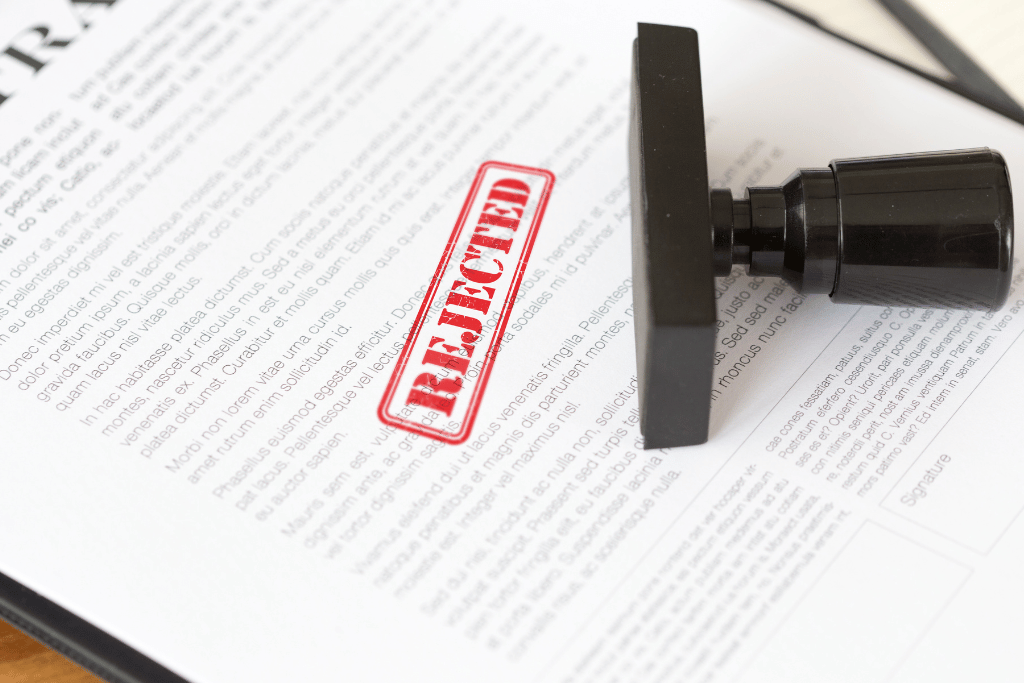A rejected home insurance claim isn’t the end of the road. If you’ve had your claim denied, there are still a number of steps you can take to ensure you’re not left to foot the repairs bill yourself.
In this blog, we’ll provide the answers to some key questions, including:
- Why has my home insurance claim been rejected?
- Will a rejected home insurance claim affect my insurance premium?
- Why is my insurer not paying out on the full amount of my claim?
- My home insurance claim has been rejected. What can I do?
- How can I protect myself against the same situation in the future?

If your home insurance claim has been denied, your insurer should have outlined the reason for rejecting your claim in their outcome letter. Some of the most common reasons for a negative claim outcome include:
1) Lack of cover
Your claim may have been rejected because the damage or particular incident you’ve submitted in your claim isn’t covered by your policy. Make sure to carefully review your policy to check that it aligns with the type of loss you’re claiming.
If this is proving difficult, you might consider working with a loss assessor, who can handle the claim on your behalf and review your documents to check that the type of damage you’ve experienced is covered by your policy.
2) Delays in submitting the claim
Failing to notify your insurer in good time (i.e. shortly after the incident has taken place) could lead them to doubt your claim and may even provide grounds for the rejection of your claim.
3) Giving false or inaccurate information
Inaccurate or false information, whether provided intentionally or by mistake, can give your insurer grounds to reject your claim.

4) Policy exclusions
Some damage, such as wear and tear, will not be covered by your insurance policy because it’s considered a gradual and inevitable process that affects all property over time. An insurance policy is in place to protect you against sudden and unexpected losses — but even so, it’s important to check and understand your policy documents so you know what it covers.
Some modern home insurance policies don’t incorporate the damages that have previously been part of standard coverage, while others speculate over the definitions of certain types of damage, so it’s important to review your documents to know where you stand.
5) Not following the claims process
The claims process is quite particular and can be tricky to follow, especially if you’ve never been through it before. However, it’s absolutely key to make sure you move through the process step by step, without missing anything out.
Failing to follow the specific steps could lead to a rejected claim, so if you’re struggling and need assistance getting things right throughout the claims process, consider working with a loss assessor, who will be able to handle it all on your behalf.
6) Technicalities and sticking points
You may have purchased your insurance policy believing it covers everything you need it to, only to realise that the policy wording makes certain losses and types of damage exempt from a claim. We commonly see the definition of ‘storm damage’ changing between providers, or policyholders becoming unstuck because the item that was stolen or damaged was actually used for business purposes and therefore isn’t covered by their policy.
For this reason, it’s vital to re-read your policy and get to grips with the terms and exclusions, so you know exactly what’s covered when the time comes to make a claim.
7) Lack of reasonable care
When reviewing your insurance policy you may find it has a “reasonable care” clause built in, which is not uncommon. A “reasonable care” clause essentially states that you, as the policyholder, will take necessary steps to prevent having to make a claim.
For example, if you have been burgled whilst the door to your property was left unlocked, your insurer may choose to reject your claim on the grounds that “reasonable care” was not taken, which ultimately led to the claim being made.

Will a rejected home insurance claim affect my insurance premium?
Whilst a rejected home insurance claim can impact your premiums, this isn’t always the case, and the actual result will be dependent on your particular circumstances.
There are several ways a rejected home insurance claim could impact your premiums:
1) Your premiums could increase
Even if your claim has been denied, the insurer may view you as a higher risk customer, more likely to make a claim in the future, when you’ve already made a claim on your policy. For this reason, your insurance premiums might go up, reflecting this higher level of risk.
2) Your cover may reduce
Again, if your insurer is concerned that you may be more likely to make a claim on your policy in the future, they may choose to reduce the amount of cover they’re happy to offer as part of your policy. This might mean you’re offered a policy with a lower cover limit, or one where certain types of cover are excluded.
3) You may find it difficult to find appropriate insurance
If your insurer views you as a higher risk customer due to a claim made on your policy - whether it has been successful or not - they may be reluctant to insure you altogether. If this is the case, don’t be surprised if you find yourself having to pay a higher premium to get the cover you need, or settle for a policy with lower levels of cover, depending on the options available to you.

Why is my insurer not paying out on the full amount of my claim?
In some cases, your home insurance claim might not be rejected outright — instead, your insurer may agree to pay out a portion of the total claim amount. This usually happens where your property is underinsured, or if the insurer believes the claim value you’ve submitted is unrealistic.
In such circumstances, having a loss assessor involved with managing your claim can be a lifesaver. Not only will your loss assessor have an expert level of understanding in terms of formulating your claim and knowing what can and can’t be claimed for (in line with your policy), but they’ll also be there to engage with the insurer on your behalf, question any outcomes, and fight to secure the settlement you deserve.
When you team up with Action Insurance Repair, in most cases, we’ll involve a trusted independent loss assessor from the very earliest stages, so you can rest assured that all insured losses are included in your claim, and you’ll have expert support every step of the way — even if/when you need to appeal a claim outcome to ensure a fair settlement.
Need our help? Get in touch with a member of our team today.

My home insurance claim has been rejected. What can I do?
If you’ve received a negative outcome from your claim, don’t panic! A rejected claim is not the end of the road. Consider taking these steps:
1) Understand the reason your claim has been rejected
Ask your insurer to confirm their reasons for rejecting your claim in writing. When provided, be sure to read this document thoroughly to get a clear understanding of their reasoning, making note of any specific clauses or conditions they bring to light from your policy.
2) Review your policy
Once you’ve got to grips with the insurer’s reasoning for refusing your claim, return to your policy documents and review them thoroughly, making sure all terms and conditions have been met.
3) Contact your insurer
If you feel at this point as though your claim has been unfairly rejected, you might consider contacting your insurer directly to begin the appeal process. You can do this informally, by requesting further clarification or an outline of the evidence their decision was based upon. If this doesn’t re-open negotiations, you might then consider pursuing a formal appeal through their appeal process.
4) Document everything
This is a protective measure that can be especially valuable if you ever find you need to escalate a complaint to your insurer or the Financial Ombudsman. Be sure to keep a record of all correspondence between you and the insurer in relation to your claim. Emails, phone calls, written letters — it can all be helpful when evaluating your complaint. If you’re working with a loss assessor, they will likely file all of this evidence on your behalf just in case.

5) Ask for expert help
Submitting a claim and dealing with your insurer yourself can be stressful, especially if your claim is rejected. Loss assessors are experts in handling insurance claims, and will work tirelessly on your behalf to ensure the process doesn’t leave you out of pocket. If you’ve had a claim rejected, consider instructing a trusted loss assessor. As a claims expert, they’ll be able to guide you along your next steps towards a favourable resolution.
If you’re working with a loss assessor who doesn’t take on claims that have already been rejected, all hope is not lost. In this case, you could seek expert help from a solicitor who specialises in insurance claims. Some will even work on a no-win, no-fee basis, meaning you won’t be left out of pocket if the insurer’s rejection of your claim is upheld.
6) Submit a complaint
If you believe your claim has been unfairly rejected, and you’re not working with a loss assessor, you can still launch an appeal and file a complaint with your insurer yourself. You’ll find your insurer’s complaints process outlined in your policy documents. Be sure to provide any additional evidence or information that may support your claim, and chase things up regularly to ensure your complaint is being dealt with.
7) Contact the Financial Ombudsman Service
If the complaint you’ve submitted to your insurer is dismissed, or you still feel you’ve been treated unfairly, you might consider contacting the Financial Ombudsman Service (FOS). The FOS is an independent agency that seeks to ensure complaints between financial businesses and their customers are handled in a fair and reasonable way. It’s free to submit a complaint, and you can do this once you have received the final response from your insurance company, or if eight weeks have passed without a response from your insurer.

How can I protect myself against the same situation in the future?
Insurance claims are often complicated, and it’s tricky to know which way your claim is likely to go. Thankfully, there are a few precautionary steps you can take to reduce the risk of experiencing a stressful claims process and potentially having your claim rejected.
1) Review your policy regularly
Circumstances change, and it’s easy to forget what they were when you first purchased your policy. It’s a good idea to review your policy on a regular basis - a couple of times a year - to make sure it definitely covers everything you need it to. You might find that you need to add optional covers like accidental damage, or list a recent high-value purchase on your policy. Whatever the change, be sure to keep your insurance policy up to date to ensure it meets your needs.
2) Keep on top of home maintenance
Keeping up with home repairs can not only minimise the chance of you needing to make a claim in the first instance, but it can also protect you against your claim being rejected on the grounds of lack of “reasonable care”. Be sure to keep on top of repairs that keep your property secure and weatherproof, and keep a record of any works carried out, as your insurer may request details of the repairs that have been undertaken when reviewing your claim.
3) Invest in the right level of cover
Underinsurance is one of the biggest challenges currently facing homeowners across the UK — you can read more about it in our recent blog. When shopping around for your next home insurance policy, it’s absolutely essential to take the time to understand what’s on offer. At the moment, online insurance providers are being called out for their lack of transparency in the sales process and the lack of care taken when handling customer claims. Don’t get caught out — speak with an independent broker to make sure the policy you purchase actually covers what you need it to so you can minimise the risk of having a future claim rejected.

Get the best outcome from your home insurance claim
If your property has been damaged, don’t face the claims process alone. At Action Insurance Repair, we specialise in supporting home owners through every step of the claims process, from providing an accurate assessment of the damage, right through to carrying out all of the repairs work so you can get back to normal.
We’re partnered with a number of trusted independent loss assessors who will be on your side throughout, working tirelessly on your behalf to secure the fairest settlement from your claim.
If you’re looking for someone to take the stress of insurance repairs from your shoulders, contact our team today.

10/24/25 5:12 PM

